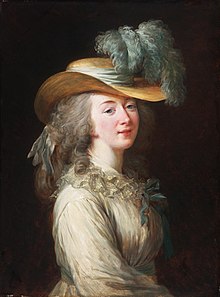Madame du Barry
Jeanne Bécu, Countess of Barry (19 August 1743 – 8 December 1793) was the last mistress of King Louis XV of France. She was one of the victims of the Reign of Terror.[1][2]
| Madame du Barry | |
|---|---|
| Countess of Barry | |
 Madame du Barry, by Élisabeth Vigée Le Brun | |
| Full name
Marie Jeanne Bécu | |
| Born | 19 August 1743 Vaucouleurs, Lorraine, France |
| Died | 8 December 1793 (aged 50) Paris, France |
| Spouse(s) | Guillaume du Barry, Count of Barry |
| Issue
none | |
| Father | Jean Baptiste Gormand |
| Mother | Anne Bécu |
Early life
changeJeanne Bécu was born in Lorraine, France. Her mother was Anne Bécu, who was a seamstress.[3] Jeanne Bécu was an illegitimate child, and her father is not known. Some people say her father was Jean Jacques Gomard, a friar known as frère Ange.
Jeanne Bécu was educated at a convent called Couvent de Saint-Aure. When she was 15 years old, she left the convent. She and her mother moved to Paris, where Jeanne sold small items on the streets.[4] Jeanne was a very beautiful, blonde-haired woman, and was later found by Jean-Baptiste du Barry, who owned a casino and trained women to be courtesans. Jean-Baptiste du Barry made Jeanne his mistress.
Official mistress of Louis XV
changeAs time passed, Jeanne became well-known with powerful people in the Kingdom of France. She had many clients in the king's court. The king soon noticed her and had her brought to his bedroom many times.[4] Since she was a commoner and did not have a royal title, she could not be a maîtresse-en-titre (official mistress). The king was worried what people would think of him being with a commoner, so the king ordered that Jeanne be married to a man who had a noble title.
On 1 September 1768, Jeanne was married to Jean-Baptiste du Barry's brother, Comte Guillaume du Barry.[5] After the wedding, Jeanne was made Louis XV's official mistress. She lived in a small room above the king's room. Jeanne was very lonely since some people still considered her a commoner.
Death
changeJeanne died at the age of 50 due to execution made by supporters of the French Revolution, a time where the common people were against people of the royalty. She is buried at the Madeleine Cemetery.
Gallery
change-
Oil on canvas, by François-Hubert Drouais.
-
Bust of Madame du Barry.
References
change- ↑ A King's favourite, Madame du Barry, and her times from hitherto unpublished documents by Claude Saint-André with an introduction by Pierre de Nolhac and 17 illustrations, New York, Mc Bride, Nast & Company, 1915, p. 3 (a translation from the French publication by Tallandier, Paris, 1909.)
- ↑ Michel Antoine, Louis XV, Librairie Arthème Fayard, Paris, 1989, p. 887.
- ↑ Haslip, Joan, Madame du Barry: The Wages of Beauty, Grove Weidenfeld, New York, 1992.
- ↑ 4.0 4.1 Kuckhahn, Geni (2019-05-08). "Madame du Barry vs Marie Antoinette". Geni Kuckhahn. Archived from the original on 2023-06-08. Retrieved 2022-04-24.
- ↑ "5 Facts About Royal Mistress Madame du Barry | Barnebys Magazine". Barnebys.co.uk. 2022-04-19. Retrieved 2022-04-24.